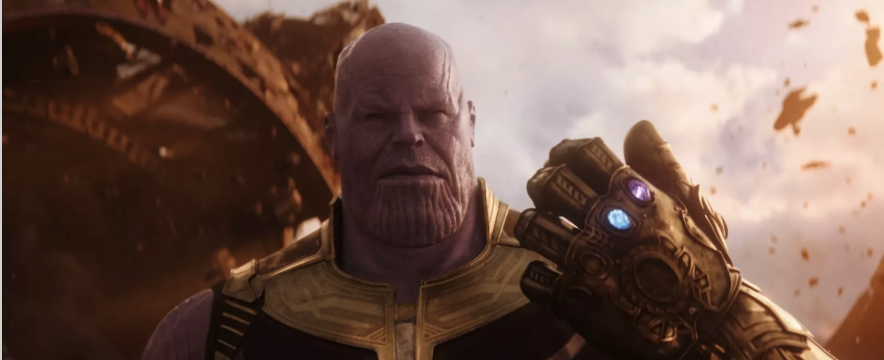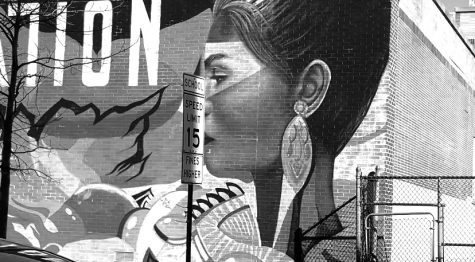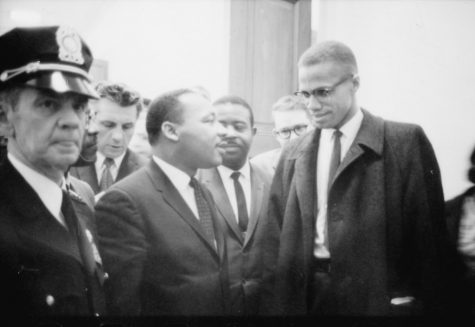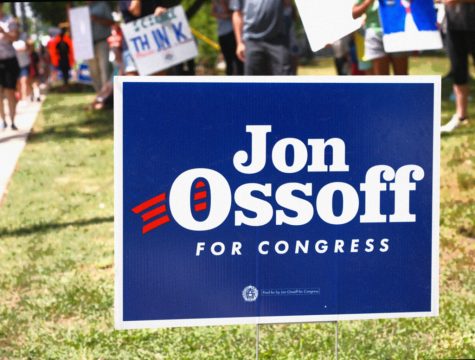Infinity War Review
May 29, 2018
Avengers Infinity War is not a movie in a traditional sense. After ten years and 18 films, the creative minds behind the Marvel Cinematic Universe (MCU) have delivered on their promise of a truly momentous spectacle, but it isn’t without fault. Despite its faults, however, it is truly remarkable and inconceivable how any film franchise can captivate audiences for so many years and manage to coalesce dozens of characters with now years of established backstory and personal arcs into any sort of cohesive story. That being said let’s focus on a few of the drawbacks as well as the triumphs associated with the Avengers Infinite War experience.
First and foremost, Thanos is a compelling villain. Marvel has always struggled with developing antagonists with complex goals and motives. Of the 18 films in the MCU, the list of memorable villains is incredibly short. Bard from a few exceptions like Loki (Tom Hiddleston) from Avenger, Vulture (Michael Keaton) from Spiderman Homecoming and Killmonger (Michael B. Jordan) from Black Panther, the “Marvel Formula” primarily requires the antagonist to be either evil for evil’s sake and the villainous version of the protagonist. In the first Ironman film, Ironman (Robert Downey jr.), a guy in advanced armor, fought Iron Monger (Jeff Bridges), a guy in advanced armor. Ant-Man (Paul Rudd) can shrink, his villain Yellowjacket (Corey Stoll) could shrink. Hulk (Mark Ruffalo) is a monster, Abomination (Tim Roth) is a monster. Dr. Strange (Benedict Cumberbatch) is a wizard, Kaecilius (Mads Mikkelsen) is a wizard. Even, Killmonger despite having interesting motives wore an alternate version of the Black Panther suit. Thanos is unique in the sense that one could argue his motivations are just. On a planet be drained of resources in order to support a growing population, he campaigned the idea of eliminating half the population at random. No rank, behavior, or social class would be a factor and those who survive could live freely in a world, not on the brink of decay. With his people dead after ignoring his claims, he seeks to balance the universe. Thanos’ arch is also the only traditional hero arc of the entire film. In a story full of sacrifices for the greater good, our “heroes” refuse to sacrifice the “life” of the android Vision (Paul Bettany), who is fused with the mind stone, until it’s already too late. However, Thanos is able to sacrifice the only person he truly cares for, his own daughter Gamora (Zoe Saldana) for his cause, but not without shedding a tear and as a result, he ultimately succeeds.
This opens a major criticism of the film; however, until this point each death felt impactful. The loss of characters like Heimdall (Idris Elba) felt legitimate as minor supporting characters are often the most expendable. Simply put the Avengers need to have people to avenge. The death of Loki was powerful because of his prevalence throughout the MCU and was not left as ambiguous as other attempts on his life. The death of Gamora is a crucial element of Thanos’ character arch and was impactful considering Gamora is a staple figure of the Guardians of the Galaxy films. Unfortunately, as thematically interesting as it is to witness Thanos as successful in his plans to eliminate half the universe, the “loss” of specific characters as a result of his victory undercuts any real dramatic tension. Does anyone truly believe that Spiderman (Tom Holland) is dead forever? That, the centerpiece of his blockbuster and culture phenomenon Black Panther, King T’challa (Chadwick Boseman) is not returning? It’s understandable that the Russo Brothers would like the sequel to Infinity War to focus on the original ensemble cast, as they are least likely to return for further installments and their characters deserve a satisfying send-off. However, knowing that death can be reversed removes the stakes from any moment of tension. It will be interesting to see how the sequel to Infinity War will manage to keep audiences in suspense even though at some point, characters will be able to reverse death.
In this film, there are a vast amount of characters and a majority of the fears surrounding this movie arose from the idea of: “How do you balance a movie with so many characters while allowing each of them to play a meaningful service to the plot?”. Well, apparently you can not, at least not when it comes to Captain America (Chris Evans). Throughout the Avengers franchise, Captain America has been a marquee character and it is no mystery to dedicated fans that Chris Evans will likely leave the MCU within the coming years. Captain America’s story was one of a goody-two-shoes soldier in an era where, in war, the enemy was clear and the country was confident that they were the “good guys”. Now thrust out of time, he learns war isn’t so simple and that the institutions he laid down may have always been corrupt. The film Captain America Civil War was his rebellion from the organized institutions that had psychologically manipulated his closest friend Bucky Barnes (Sebastian Stan) and fans were eager to discover what had become of this character whose ideals and worldview have completely been turned upside down. Instead, audiences received some interesting actions scenes, a devastatingly underwhelming reunion between Captain America and Bucky, and a pathetic homage to the Infinity Gauntlet comic. The comic which saw Captain America, seemingly powerless against Thanos, facing him head-on as a result of his unbreakable willpower was replaced in the film by a short, silent and futile attempt by Captain America to prevent a significant blow. The film manages its large cast by dividing its heroes into three squads each attempting to prevent the Thanos’ mission to eliminate half the universe. An amazing quality this film possesses is that each group of characters or familiar location feels as though they are from each of their respective movies. When members of the Avengers land in Wakanda, the Black Panther theme surrounds the audience. When Thor meets the Guardians of the Galaxy, audiences hear director James Gunn’s signature dialogue and humor. The third squad of Iron Man, Spiderman, Dr. Strange and members of the Guardians, attempts to stop Thanos on his homeworld of Titan where Dr. Strange uses the Eye of Agamotto (also known as the Time Stone) to observe all possible outcomes of their battle. This interesting plot device conveniently explains any minor plot holes since they can all be removed by knowing that every course of action will be done in order to follow Dr. Strange’s prophesied path of success.
Each of the subplots includes characters crucial to the story, but no character stands out as much as Thor the God of Thunder (Chris Hemsworth). Straight out of the gate, Avengers Infinite War picks up immediately after the events of the third Thor movie, Thor: Ragnarok, which finds Thor (Chris Hemsworth) trapped amongst the corpses of half of the remaining Asgardians (According to dialogue). This ties in perfectly with Thanos’ intention to slaughter half the universe because those who viewed Thor:Ragnarok may find themselves asking, “How did other Asgardians manage to survive, and where are Valkyrie and Krog, the new characters introduced in Thor:Ragnarok?”. Questions that could potentially be answered in the Infinity War sequel, but a greater number of questions may arise for all those who have still yet to see Thor: Ragnarok. The third installment of the Thor series managed to completely reinvent Thor’s character from the arrogant “fish out of water” prince whose only motivation stemmed from his love interest to a goofball with self-belief as limitless as his incredible strength and power. His growth is demonstrated during a conversation with Rocket Raccoon (Bradley Cooper) where he explains that even after losing all of his loved ones throughout the course of his films, he will never stop fighting. Thor’s message was able to resonate with audiences everywhere. When Thor lands in Wakanda with his newly forged axes, crowds erupted with cheers and applause after truly feeling satisfied with a character they have watched develop over many years. This illustrates a complaint that many have towards Infinity War, that it requires 18 movies of backstory to fully understand the weight of each character’s decisions and actions. This complaint, however, seems unfounded and is often why people claim Infinity War is not a movie. In isolation, Infinity War is enjoyable and gives enough relevant information for casual viewers to understand the plot through dialogue. Not only this, but dedicated viewers are rewarded and left completely satisfied with a majority of the character arcs displayed. It’s impactful to see Tony Stark (Robert Downey Jr.) grieve the loss of Spiderman when viewers understand the father-son dynamic depicted in Spider-Man: Homecoming, when viewers understand the journey this character has undergone in order to simply show affection to others as opposed to being selfish, a journey which began in the the first Iron Man film. This film fully capitalizes on the idea of an extended universe in a way that no other cinematic franchises can possibly accomplish at the moment, and that should be celebrated as a unique marvel (pun intended) of the film industry.













